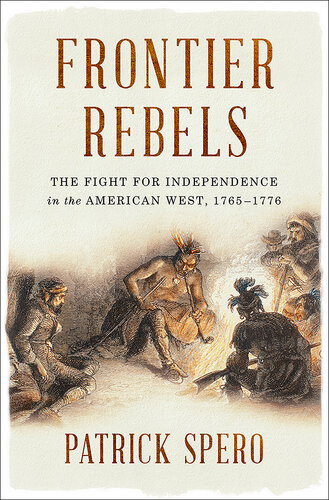
Frontier Rebels
The Fight for Independence in the American West, 1765-1776
کتاب های مرتبط
- اطلاعات
- نقد و بررسی
- دیدگاه کاربران
نقد و بررسی

June 15, 2018
A persuasive effort to locate the origins of the American Revolution not in Boston Harbor but in the dense woodlands of western Pennsylvania.The Black Boys Rebellion, commemorated in the 1939 John Wayne vehicle Allegheny Uprising, takes its name from a Pennsylvania militia outfit's practice of dressing in Indian garb and blackening their faces before going into the field. They had formed to battle Indian raids on what was then British America's far western frontier. At the conclusion of the Seven Years War, the British Crown had decided to make peace with the Indian nations, in part by forbidding Americans from settling in country that they regarded as rightfully theirs. "Colonists in war-torn regions felt there could be no peace with Native Americans," writes Spero (Frontier Country: The Politics of War in Early Pennsylvania, 2016, etc.), the librarian of the American Philosophical Society. "These colonists instead saw Native groups as threats that needed to be removed." When the British government sent agents to the frontier to bring trade goods as peace offerings to the Natives, the militia turned their arms on their colonial masters. Although the story of their rebellion is in itself a small one relative to the larger history of the British Empire in North America, Spero does a good job of examining its implications. There was a class element, for example, in the hope of landholders to slowly settle the west "instead of permitting colonists to pursue their desire for unfettered expansion," and there were significant differences in the attitudes of the first frontier president, Andrew Jackson, and predecessors such as George Washington and Thomas Jefferson in how Native peoples were to be treated. Interestingly, the author also locates an early stirring of the Second Amendment in Black Boys' leader James Smith, who drafted the revolutionary constitution of Pennsylvania that asserted that "the people have a right to bear arms for the defence of themselves and the state."A welcome contribution to frontier history.
COPYRIGHT(2018) Kirkus Reviews, ALL RIGHTS RESERVED.

Starred review from June 25, 2018
The American Revolution has traditionally been depicted as a struggle between North American settlers and British imperial forces, but this intensively researched study from Spero, the director of Philadelphia’s American Philosophical Society Library, analyzes the crucial role of settler attitudes toward Native Americans in sparking the conflict. While administrators in London viewed Native people as important trading partners within their American empire, many white colonists saw them as a terrifying menace and “wanted to be free of the Indians as much as they wanted to be free of their imperial overlords.” Spero tells of the little-studied Pennsylvania backcountry rebels called the Black Boys, who in 1765 revolted against Britain’s willingness to accommodate Native interests. Readers who have been accustomed to considering the Revolutionary War as a conflict between American liberty and British oppression may find this account discomfiting, but Spero presents convincing support for his thesis that hatred of Indians and desire for their lands played a pivotal role in fomenting the revolution and “produced the roadmap” for the next century of American history, delving deeply into previously underutilized sources, including the journals of fur trader George Croghan. Spero’s thoughtful work is an important contribution to ongoing reassessments of the nature and meaning of the American founding.

September 1, 2018
Spero (librarian, American Philosophical Society, PA; Frontier Country) recounts the little-known rebellion of the Black Boys-- white settlers who blackened their faces and dressed as Natives--against British rule on the Pennsylvania frontier. Spero argues effectively that the grievances of the Black Boys reflected "the political divisions and social tensions between rural and urban American [that] have always been a major part of the nation's politics." Frontier settlers clashed with French and British forces as well as Indian tribes during the Seven Years' War. At the conflict's end in 1763, settlers looked to a victorious but near-bankrupt British government to protect them from further depredations. Instead, to reduce their military presence and expense in the colonies, the British aggressively pursued a policy of ameliorative trade with Indian tribes. Colonial Eastern elites, disproportionately represented in the Pennsylvania Provincial Assembly, eagerly embraced trade opportunities over fearful objections of the underrepresented frontier. In this lay the seeds of the American Revolution. VERDICT For professional and casual historians of early American government, military, and citizen protest movements, this well-researched and concisely written monograph takes a timely look back at the history and spirit of dissent.--John Muller, Dist. of Columbia P.L.
Copyright 2018 Library Journal, LLC Used with permission.

























دیدگاه کاربران